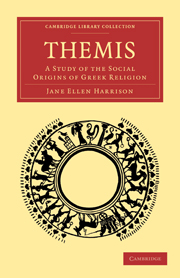Book contents
- Frontmatter
- PREFACE TO THE SECOND EDITION
- INTRODUCTION
- Contents
- ADDENDA ET CORRIGENDA
- CHAPTER I THE HYMN OF THE KOURETES
- CHAPTER II THE DITHYRAMB, THE Δρώμενον AND THE DRAMA
- CHAPTER III THE KOURETES, THE THUNDER-RITES AND MANA
- CHAPTER IV MAGIC
- CHAPTER V TOTEMISM, SACRAMENT AND SACRIFICE
- CHAPTER VI THE DITHYRAMB, THE SPRING FESTIVAL AND THE HAGIA TRIADA SARCOPHAGOS
- CHAPTER VII THE ORIGIN OF THE OLYMPIC GAMES
- CHAPTER VIII DAIMON AND HERO
- CHAPTER IX FROM DAIMON TO OLYMPIAN
- CHAPTER X THE OLYMPIANS
- CHAPTER XI THEMIS
- INDEX
CHAPTER V - TOTEMISM, SACRAMENT AND SACRIFICE
Published online by Cambridge University Press: 07 October 2011
- Frontmatter
- PREFACE TO THE SECOND EDITION
- INTRODUCTION
- Contents
- ADDENDA ET CORRIGENDA
- CHAPTER I THE HYMN OF THE KOURETES
- CHAPTER II THE DITHYRAMB, THE Δρώμενον AND THE DRAMA
- CHAPTER III THE KOURETES, THE THUNDER-RITES AND MANA
- CHAPTER IV MAGIC
- CHAPTER V TOTEMISM, SACRAMENT AND SACRIFICE
- CHAPTER VI THE DITHYRAMB, THE SPRING FESTIVAL AND THE HAGIA TRIADA SARCOPHAGOS
- CHAPTER VII THE ORIGIN OF THE OLYMPIC GAMES
- CHAPTER VIII DAIMON AND HERO
- CHAPTER IX FROM DAIMON TO OLYMPIAN
- CHAPTER X THE OLYMPIANS
- CHAPTER XI THEMIS
- INDEX
Summary
‘WHAT MEANEST THOU BY THIS WORD SACRAMENT?
We have seen how the mystic, at his initiation by the Kouretes, ‘accomplished the Thunders.’ Another rite remains, more dread and, to our modern thinking, utterly repugnant. Before he can become a Bacchos, the candidate must have
Fulfilled his red and bleeding feasts
The omophagia or Eating of Raw Flesh was a rite not confined to the Kouretic initiation of a Bacchos. We meet it again in the Thracian worship of Dionysos. The Bacchae when they recount τὰ νομισθέντα, their accustomed rites, sing the glory and
joy of the quick red fountains,
The blood of the hill-goat torn.
The Bacchoi in Crete eat of a bull, the Bacchae in Thrace and Macedon of a hill-goat; the particular animal matters little, the essential is that there should be a communal feast of Raw Flesh, a δαὶς ὠμοφάγος.
Physically repugnant the rite must always be to our modern taste, which prefers to cook its goats and bulls before eating them; but our moral repugnance disappears, or at least suffers profound modification, when the gist of the rite is understood. What specially revolts us is that the tearing and eating of bulls and goats should be supposed to be a sacrifice pleasing to a god. We naturally feel that from the point of view of edification the less said about the worship of such gods the better.
- Type
- Chapter
- Information
- ThemisA Study of the Social Origins of Greek Religion, pp. 118 - 157Publisher: Cambridge University PressPrint publication year: 2010First published in: 1912



